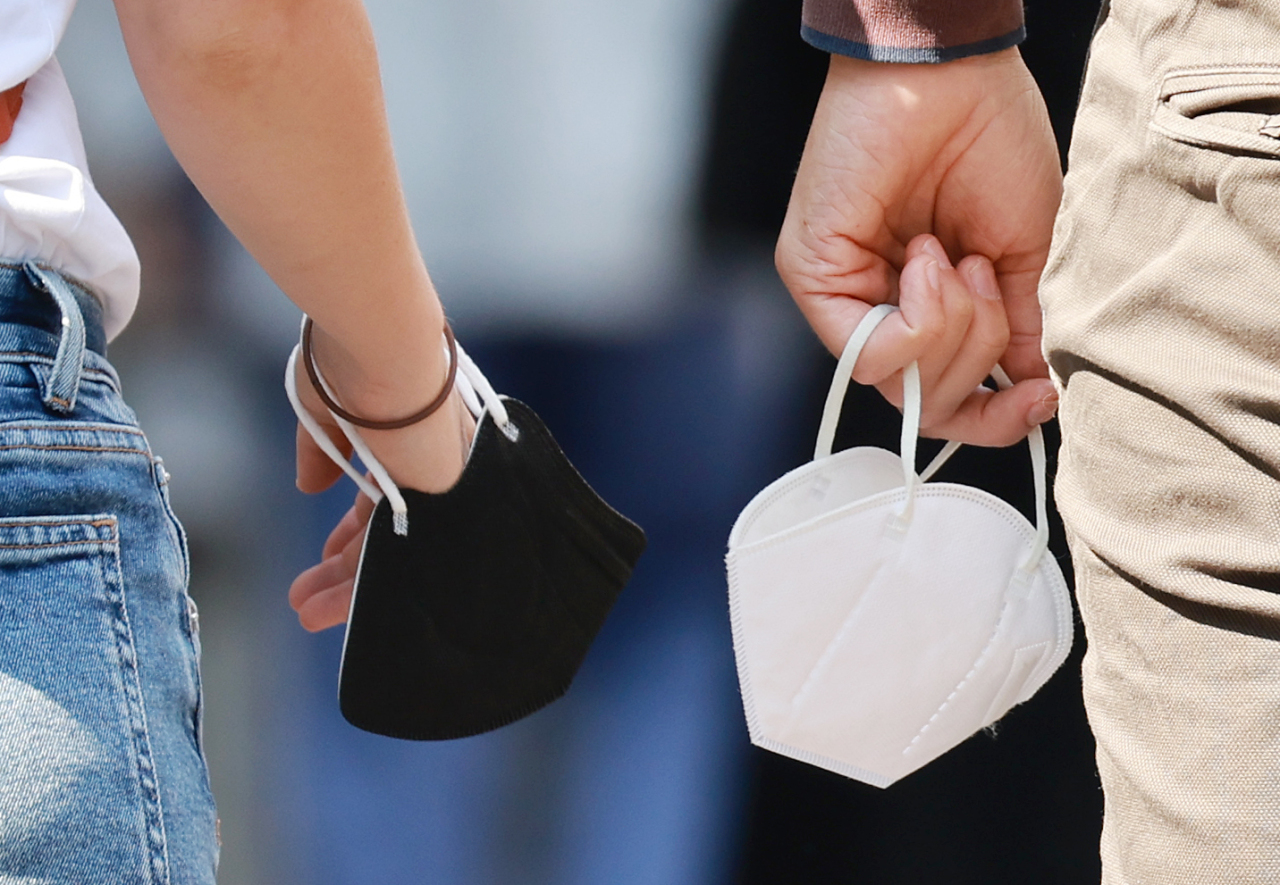South Korea is keeping mandatory masking indoors
Antibody survey shows 57 percent recently infected
By Kim ArinPublished : Sept. 23, 2022 - 19:17

South Korea said Friday it was ending its mask mandate outdoors for the first time it was introduced over a year ago.
The mandate, which took effect April last year, has required people to stay masked during outdoor gatherings involving large groups such as rallies, sporting events and concerts. Starting next week, mask-wearing will not be necessary at all outside.
The change is an expansion of the easing in the mandate earlier in May, which allowed people to be mask-free in an outdoor setting that does not require close proximity to others.
The mandatory masking indoors will stay in light of the flu season and a possible surge in COVID-19.
Korea Disease Control and Prevention Agency’s commissioner Peck Kyong-ran said during a news briefing that the end of outdoor masking “does not mean that wearing a mask is ineffective or that it’s become unnecessary.”
“In situations that don’t allow you to keep a safe distance, you are still encouraged to be masked, even if it’s outside,” she said.
At the same briefing, the KDCA said its latest survey found about 97 percent were positive for COVID-19 antibodies either through vaccination or natural infection. The survey, conducted over a month from Aug. 5 to Sept. 6, included 10,000 people aged 5 and older from 17 cities and provinces across the country.
The N-antibody positivity rate, which indicates prior infection, was 57 percent among those surveyed. This is much higher than the rate confirmed by test. As of late July about 38 percent of the entire South Korean population had tested positive at least once.
Kwon Jun-wook, the director of the Korea National Institute of Health, said at the briefing that the high antibody positivity rate “should not be taken as high level of protection in the community.”
He explained that protective antibodies are lost over time, and that the emergence of a new variant can weaken the protection offered by antibodies from a previous variant.
“This is why getting a booster vaccination is essential four months or longer following infection or vaccination,” he said.
On the survey results, Dr. Eom Joong-sik, an infectious disease professor at Gachon University Medical Center, said an N-antibody positivity rate significantly higher than the test-confirmed rates could mean a number of things.
“It could be symptomless infections going undetected, or people avoiding tests. The compromised accuracy of rapid antigen tests, which we started using for diagnosis earlier this year, could be a factor,” he told The Korea Herald.
South Korea believes that the worst of the omicron BA.5 wave that started in summer has passed.
Dr. Jung Jae-hun, a professor of preventive medicine who has worked with the KDCA on COVID-19 research and policies, said in a phone call with The Korea Herald that the country has been able to manage the situation without straining the health care systems.
Prime Minister Han Duck-soo told a government meeting on Friday that South Korea was “turning the corner on the latest COVID-19 wave.”
In the 24-hour period ending Thursday at midnight, South Korea logged 29,108 cases and 68 deaths, according to the official statistics.
So far through September, the country saw an average of 57,349 cases per day, dropping by nearly half from August’s 111,952. The daily deaths, on the other hand, hasn’t demonstrated a similar fall. In September, 57 deaths occurred per day on average rising slightly from August’s 55.
By Kim Arin (arin@heraldcorp.com)








![[Graphic News] More Koreans say they plan long-distance trips this year](http://res.heraldm.com/phpwas/restmb_idxmake.php?idx=644&simg=/content/image/2024/04/17/20240417050828_0.gif&u=)
![[KH Explains] Hyundai's full hybrid edge to pay off amid slow transition to pure EVs](http://res.heraldm.com/phpwas/restmb_idxmake.php?idx=644&simg=/content/image/2024/04/18/20240418050645_0.jpg&u=20240419100350)






![[From the Scene] Monks, Buddhists hail return of remains of Buddhas](http://res.heraldm.com/phpwas/restmb_idxmake.php?idx=652&simg=/content/image/2024/04/19/20240419050617_0.jpg&u=20240419175937)

![[KH Explains] Hyundai's full hybrid edge to pay off amid slow transition to pure EVs](http://res.heraldm.com/phpwas/restmb_idxmake.php?idx=652&simg=/content/image/2024/04/18/20240418050645_0.jpg&u=20240419100350)

![[Today’s K-pop] Illit drops debut single remix](http://res.heraldm.com/phpwas/restmb_idxmake.php?idx=642&simg=/content/image/2024/04/19/20240419050612_0.jpg&u=)